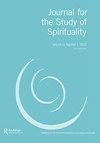Spirituality and mental health
IF 0.8
0 RELIGION
引用次数: 3
Abstract
ABSTRACT In many contexts, emotional ailments have been considered problems of religious or spiritual origin. Historically, religious groups were often the primary providers of mental health care. This changed over time with advances in medicine and Freud’s writings framing religion/spirituality (R/S) as a sign of neurosis. In the early- to mid-twentieth century, mental health and R/S were often viewed by Western clinicians and patients as separate and antithetical. Recent decades have been marked by another shift in thought, with increased interest in the overlap between mental health and R/S, and recognition that R/S may in fact serve protective and healing roles in the face of emotional suffering. There has been a concomitant increase in research investigating the connections between R/S and mental health, along with increased development and application of clinical interventions addressing the two in combination. In this narrative review, we summarize the history of how mental health and R/S have been viewed as relating to one another, recent research evidence on the effects of R/S on mental health, and clinical implications of these findings. We conclude with a discussion of ongoing challenges and opportunities in the study and application of how mental health and R/S affect one another.精神和心理健康
在许多情况下,情绪疾病被认为是宗教或精神起源的问题。从历史上看,宗教团体往往是精神卫生保健的主要提供者。随着医学的进步和弗洛伊德的著作将宗教/灵性(R/S)作为神经症的标志,这种情况随着时间的推移而改变。在二十世纪早期到中期,西方临床医生和患者经常将心理健康和R/S视为分开和对立的。最近几十年的另一个特点是思想上的转变,人们对心理健康和R/S之间的重叠越来越感兴趣,并认识到R/S实际上可能在面对情感痛苦时起到保护和治疗作用。与此同时,调查R/S与心理健康之间联系的研究也有所增加,同时,针对这两者的临床干预措施的开发和应用也有所增加。在这篇叙述性综述中,我们总结了心理健康和R/S如何被视为相互关联的历史,关于R/S对心理健康影响的最新研究证据,以及这些发现的临床意义。最后,我们讨论了心理健康和R/S如何相互影响的研究和应用中正在面临的挑战和机遇。
本文章由计算机程序翻译,如有差异,请以英文原文为准。
求助全文
约1分钟内获得全文
求助全文
来源期刊

Journal for the Study of Spirituality
RELIGION-
CiteScore
2.50
自引率
7.10%
发文量
25
期刊介绍:
Journal for the Study of Spirituality is a peer-reviewed journal which creates a unique interdisciplinary, inter-professional and cross-cultural forum where researchers, scholars and others engaged in the study and practices of spirituality can share and debate the research, knowledge, wisdom and insight associated with spirituality and contemporary spirituality studies. The British Association for the Study of Spirituality (BASS) organises a biennial international conference and welcomes enquiries about membership from those interested in the study of spirituality in the UK and worldwide. The journal is concerned with what spirituality means, and how it is expressed, in individuals’ lives and communities and in professional practice settings; and with the impact and implications of spirituality in, and on, social policy, organizational practices and personal and professional development. The journal recognises that spirituality and spiritual values can be expressed and studied in secular contexts, including in scientific and professional practice settings, as well as within faith and wisdom traditions. Thus, Journal for the Study of Spirituality particularly welcomes contributions that: identify new agendas for research into spirituality within and across subject disciplines and professions; explore different epistemological and methodological approaches to the study of spirituality; introduce comparative perspectives and insights drawn from different cultures and/or professional practice settings; aim to apply and develop sustained reflection, investigation and critique in relation to spirituality and spiritual practices; critically examine the values and presuppositions underpinning different forms of spirituality and spiritual practices; incorporate different forms of writing and expressions of spirituality.
 求助内容:
求助内容: 应助结果提醒方式:
应助结果提醒方式:


